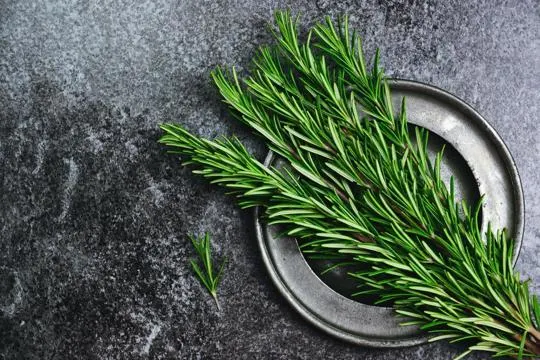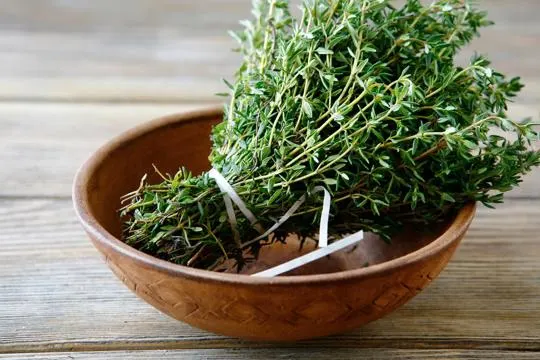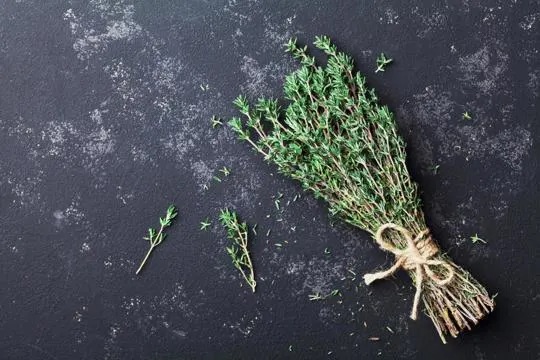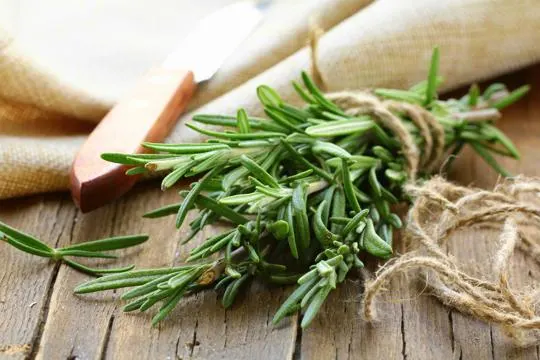Summary of key points
The main difference between rosemary and thyme lies in their flavor profiles. Rosemary has a strong, pine-like taste with hints of lemon and pepper, while thyme has a more subtle, earthy flavor with notes of mint and citrus. This affects their uses in cooking – rosemary is often used as a bold seasoning for meats and vegetables, while thyme is a popular herb for adding depth to sauces, stews, and soups. Additionally, the texture of fresh rosemary is more woody and tough compared to the delicate leaves of thyme. Ultimately, both herbs offer distinct flavors that can elevate your dishes in different ways.
Rosemary and Thyme are not just names from an old folk song. They’re the real MVPs in our kitchens.
Both pack a punch of flavor, yet each plays its unique tune in the symphony of savories and sweets. We’ve all had that moment, standing clueless in front of our spice rack. Which one was it that grandma used in her legendary roast chicken? And didn’t one of them make it into that fancy cocktail we had last summer?
In our quest to demystify these aromatic titans, we’ll uncover their identities. Rosemary, with its piney presence, claims a stake in robust dishes. Thyme, subtle and minty, slips into soups and cocktails like a flavor ninja.
We’ve all been there – a last-minute Google search under the kitchen lights. No shame in our cooking game. Today, we’re leveling up. Welcome to the showdown: Rosemary vs Thyme.
What is Rosemary?

Rosemary is an aromatic herb with needle-like leaves and a strong scent.
It has been used for centuries in cooking, medicine and religious ceremonies.
From the Mediterranean region, it is now grown worldwide.
Its distinct smell comes from its essential oils, released when the leaves are crushed or bruised.
These oils not only add flavor to dishes, but also have potential health benefits.
They contain compounds like rosmarinic acid and antioxidants.
These may reduce inflammation and aid digestion.
Rosemary has a long history of medicinal use.
It may boost memory and concentration, relieve headaches and soothe muscle pain.
Some studies suggest it may even have anticancer properties, but more research is needed.
This herb is unique in its ability to thrive in dry and sunny conditions.
This makes it great for landscaping and gardening, such as a border plant or fragrant flower bed addition.
What is Thyme?

Thyme is renowned in the culinary world for its distinct aroma and flavor.
It’s part of the mint family and has small, aromatic leaves.
Native to the Mediterranean, it’s been used for centuries for both cooking and medicinal purposes.
What makes thyme unique is its flavors.
They range from sweet to savory, and have hints of mint and citrus.
This makes it a favorite in many different cuisines.
Thyme is often added to meats, stews, soups, and marinades to add depth and flavor.
Thyme also has health benefits.
Its antioxidants help the immune system and fight inflammation.
Plus, thyme oil has antimicrobial properties to help fight bacteria.
Thyme is easy to grow, and loves sunny, well-drained soil.
It’s also attractive and fragrant, so it’s great for landscaping.
Differences Between Rosemary and Thyme

Rosemary and thyme may look alike, but have different traits.
Rosemary has needle-like leaves while thyme has small ones.
Rosemary has a robust, piney taste, but thyme is more subtle and earthy.
Rosemary is perfect for Mediterranean dishes, like roasted meat and veg.
Whereas thyme is great in French cuisine, like soups, stews, and marinades.
Health-wise, rosemary has antioxidants to boost memory and digestion.
Thyme has antibacterial properties and helps with respiratory issues.
Both herbs offer unique flavors and benefits, making them invaluable in the kitchen.
Appearance and Plant Characteristics
Rosemary and thyme may have a common purpose, but their looks and plant features set them apart.
Here’s what makes them unique:
- Rosemary: Long, needle-like leaves – dark green on top, silver underneath. Dense branches and flowers in shades of blue, purple, white, or pink.
- Thyme: Tiny oval-shaped leaves – ranging from green to grayish-green. Woody, brittle stems.
- Rosemary’s Growth: Up to 4 feet tall and wide. Grows into a shrub-like plant with a thick trunk and many branches.
- Thyme’s Growth: Stays smaller than rosemary – 8-12 inches tall. Spreads outwards, forming low-growing ground cover.
Rosemary has a piney aroma and strong flavor.
Thyme has a minty scent, and a more subtle taste.
Both are indispensable in various cuisines.
So, when adding herbs to your cooking, consider the unique appearance and plant characteristics of rosemary and thyme.
They bring diverse essences to your cooking experience – not just taste.
Flavor and Aroma
Rosemary and thyme each have unique flavors.
Rosemary tastes a bit like pine with a hint of citrus.
Thyme has a delicate, earthy flavor with a touch of lemon.
You can use either one to bring a special character to your recipes.
Pick whichever one suits your dish, whether you want robust flavor or a gentle infusion.
These herbs offer plenty of possibilities for enhancing your cooking.
Culinary Uses and Pairings
Rosemary and thyme are aromatic herbs with unique flavors.
Rosemary has a pine-like taste, great for Mediterranean dishes.
It adds depth when used with roasted meats like lamb or chicken.
Or, add it to oils and vinegars for dressings and marinades.
Thyme’s flavor is more subtle and earthy.
It can be used to season soups, stews, sauces, veggies, and fish.
Together, rosemary and thyme create a harmonious blend, perfect for savory dishes like potatoes and herb breads.
Medicinal and Health Benefits
Rosemary and thyme have long been treasured for their amazing benefits. Here’s why they’re so great:
Rosemary:
- Enhances brain power: Studies say rosemary can help improve memory, concentration, and thinking skills.
- Assists digestion: Rosemary has been used to help digestion and ease stomach issues.
- Fights inflammation: The anti-inflammatory properties of rosemary can help with conditions like arthritis.
- Strengthens immunity: It’s full of antioxidants that help fight off infections.
- Eases breathing: Inhaling the aroma of rosemary oil can help with respiratory issues like congestion.
Thyme:
- Relieves coughs and colds: Thyme is often used to treat respiratory illnesses.
- Supports heart health: Its compounds reduce blood pressure and cholesterol levels.
- Alleviates menstrual pain: Its antispasmodic properties help with cramps and discomfort.
- Lifts your mood: The scent of thyme can help reduce stress and promote relaxation.
- Boosts immunity: It contains essential vitamins and minerals that support the immune system.
Rosemary and thyme each have their own unique qualities.
For instance, rosemary is great for natural cleaning products.
Meanwhile, thyme is perfect for cooking because of its flavor.
These herbs offer countless health and medicinal benefits that’ll improve overall well-being.
Incorporate either rosemary or thyme into your routine for a holistic lifestyle.
Similarities Between Rosemary and Thyme

Rosemary and thyme – two herbs popular for cooking.
Both come from the mint family, and have a strong smell.
They are also known for their medicinal properties and are used in alternative medicine.
Even though they look different – rosemary having needle-like leaves and thyme featuring small round leaves – they both contain antioxidants and have antimicrobial qualities.
Plus, they can be fresh or dried – making them useful for various cuisines.
Taste-wise, rosemary and thyme offer unique yet complementary flavors.
Rosemary is piney with a hint of bitterness.
Thyme, on the other hand, is earthy and slightly sweet.
This makes them ideal for roasted meats, soups, stews, and even baked goods.
These herbs have a historical significance too.
Rosemary was used by the ancient Greeks to improve memory.
Thyme was used for its antiseptic properties and to treat respiratory issues.
Finally, rosemary and thyme are easy to grow.
They need well-drained soil and lots of sunlight.
They also require minimal care but yield plenty of harvests.
Cooking Tips: When to Use Rosemary or Thyme?
Cooking? Rosemary and thyme can make a difference.
Both herbs have distinct flavors and aromas.
They may be similar, but have unique characteristics.
Rosemary is known for its pine-like flavor and citrus hints.
It’s great for savory dishes such as meats, potatoes, and soups.
Plus, its aroma adds depth to marinades and sauces.
Rosemary also pairs well with garlic, lemon, and olive oil.
Thyme has a more subtle, earthy flavor.
It’s minty and lemony, and used in Mediterranean and French dishes.
Thyme adds complexity to poultry, stews, sauces, and veggies.
It goes well with oregano and basil too.
Choose the flavor you want. Rosemary is bolder, but thyme is milder.
Fresh herbs have a stronger flavor, use these near the end of cooking.
Dried herbs are more concentrated, add these earlier.
Conclusion
All in all, it’s easy to see the differences between rosemary and thyme.
Rosemary has a fragrant aroma with a more earthy and pungent flavor.
It can be hardy in nature and tends to work best when used as a seasoning for grilled meat, meats roasted in the oven, added to vegetable dishes or used for seasoning soups and stews.
Thyme on the other hand is more subtle with its woodsy flavoring, making it a great herb for flavoring soups, sauces, vegetables, egg dishes and breads.
It also works well when paired with fish thanks to its ability to overpower many of the fish’s gamey notes.
Both rosemary and thyme are important herbs that can elevate your cooking if you know how to use them properly so don’t forget to give each their due.
Last but not least – use only organic ingredients where possible so that you can reap all the health benefits these herbs have to offer too.
Whether you choose rosemary or thyme as your favorite herb – enjoy exploring the unique flavors they bring into any dish.

Leave a comment